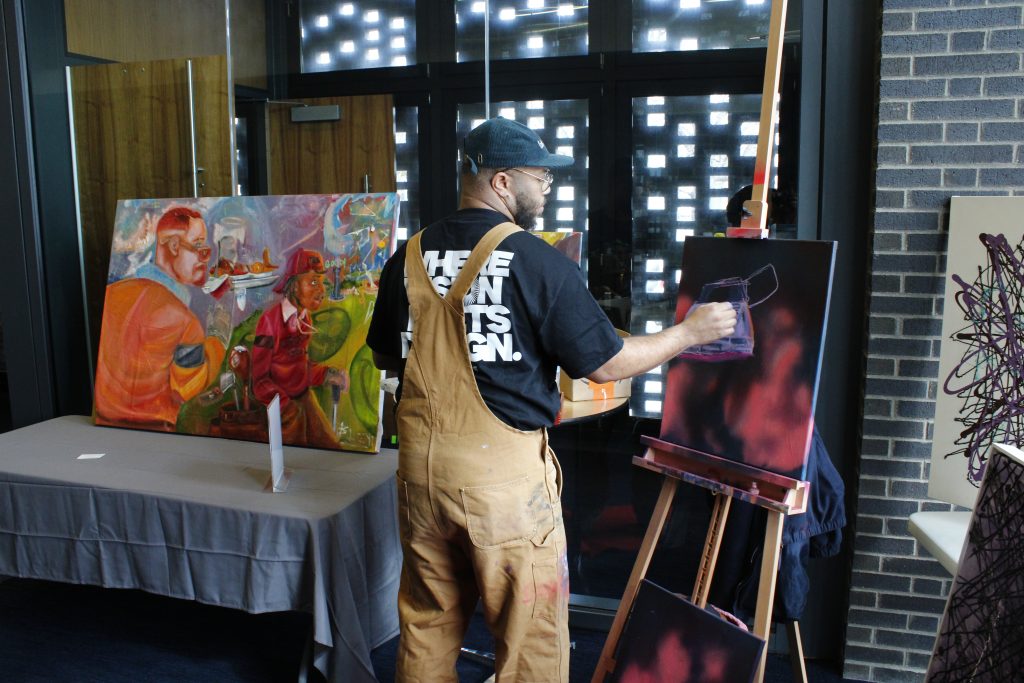WASHINGTON PARK — A local advocacy group will hand out more than $1 million over the next three years to support art projects that preserve and grow the “cultural identities” of Chicago’s neighborhoods.
Elevated Chicago will grant $350,000 a year for three years to support public arts projects at developments near transit. The funding aims to “activate” neighborhood gathering spaces while bringing more artists into urban planning and development processes.
Elevated Chicago, a collaborative which works to promote equitable transit-oriented developments citywide, received $1.5 million from the MacArthur Foundation to manage the program.
The grant program will launch in early August, Elevated Chicago manager Marly Schott said. Grant amounts will be determined on a project-by-project basis, while some of the program’s funding will pay local artists to review applications and develop grant criteria, Schott said.
“This core group of artists that we’re able to stipend who are interested in really committing — not everybody has the time to do that,” she said. “Those folks will be the primary decision-makers for the granting.”
The grants were announced as part of Elevated Chicago’s new “arts and culture strategy,” which aims to “protect, preserve and perpetuate” neighborhood cultures that are increasingly threatened as Black and Brown residents are displaced.
The grants and development strategy were announced at a presentation Thursday at the Green Line Performing Arts Center, 329 E. Garfield Blvd. in Washington Park.
An “equitable” approach to transit-oriented development is necessary, artists and advocates said at the presentation and ensuing panel discussion.
Projects near transit are desirable, but if they aren’t accessible citywide — or if they’re built without considering longtime neighbors’ needs — they can price out neighborhood residents, said Juan Sebastian Arias, executive director of Elevated Chicago.
“We saw [transit-oriented development] contributing to and exacerbating all of these inequities,” as only 10 percent of such developments were on the South and West sides from 2016 to 2020, Arias said.
Mayor Lori Lightfoot’s administration released an equitable transit-oriented development plan in 2021 seeking to encourage these developments on the South and West sides while limiting displacement.
The city’s efforts, combined with Elevated Chicago’s plan to prioritize artists’ input as transit-oriented projects move forward, can better ensure “community voice is embedded [within] community development,” co-chair Leslé Honoré said.
“How do we ensure people aren’t coming from the outside and telling us what a community needs and creating stuff without our input?” Honoré said.
Public art found in local development projects sometimes reflects developers’ connections rather than the community’s culture, said Roger Carter, a Bronzeville artist who will help review grant applications and select projects to be funded.
The grants and Elevated’s cultural strategy offer a unique opportunity to help local artists “tell their own story” about their neighborhoods as transit-oriented developments are built there, Carter said.
“A preacher who preaches in the church should live in the community, and I believe that with artists as well,” he said. “If there’s going to be installations in Bronzeville, you should have people from Bronzeville who understand the neighborhood, instead of a different entity in a different state or a different country whose cousin knows how to do art.”

Following the announcement, a panel of artists including Dorian Sylvain — who has built a career out of creating community-focused art and mentoring neighborhood artists — discussed with developers and cultural leaders the value of culturally relevant neighborhood development.
Elevated Chicago has already helped bring more than 50 transit-oriented developments to Chicago, and the arts and culture strategy can help ensure future projects do even more to benefit nearby residents, Honoré said.
“From affordable housing to retail corridors to green spaces, our communities deserve everything you see on the North Side,” Honoré said.
Block Club receives funding support from the MacArthur Foundation. Donations, advertisements, sponsorships and grants have no impact or influence on our news coverage.
Listen to the Block Club Chicago podcast:

